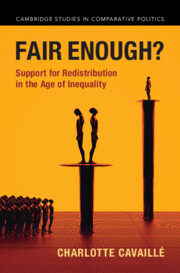Book contents
- Frontmatter
- Dedication
- Contents
- Figures
- Tables
- Acknowledgements
- 1 Demand for Redistribution in the Age of Inequality
- Part I Demand for Redistribution: A Conceptual Framework
- 2 What Is Fair?
- 3 Unpacking Demand for Redistribution
- 4 As If Self-interested? The Correlates of Fairness Beliefs
- 5 When Material Self-interest Trumps Fairness Reasoning
- Part II Changes in Demand for Redistribution
- 6 Explaining Stability and Change
- 7 Fiscal Stress and the Erosion of Social Solidarity
- 8 Partisan Dynamics and Mass Attitudinal Change
- 9 How Proportionality Beliefs Form
- 10 The Nature and Origins of Reciprocity Beliefs
- Conclusion
- References
- Index
- Cambridge Studies in Comparative Politics
1 - Demand for Redistribution in the Age of Inequality
Published online by Cambridge University Press: 07 September 2023
- Frontmatter
- Dedication
- Contents
- Figures
- Tables
- Acknowledgements
- 1 Demand for Redistribution in the Age of Inequality
- Part I Demand for Redistribution: A Conceptual Framework
- 2 What Is Fair?
- 3 Unpacking Demand for Redistribution
- 4 As If Self-interested? The Correlates of Fairness Beliefs
- 5 When Material Self-interest Trumps Fairness Reasoning
- Part II Changes in Demand for Redistribution
- 6 Explaining Stability and Change
- 7 Fiscal Stress and the Erosion of Social Solidarity
- 8 Partisan Dynamics and Mass Attitudinal Change
- 9 How Proportionality Beliefs Form
- 10 The Nature and Origins of Reciprocity Beliefs
- Conclusion
- References
- Index
- Cambridge Studies in Comparative Politics
Summary
This chapter introduces the book’s main research question, that is, the fact that rising inequality does not appear to benefit an egalitarian redistributive agenda. It shows how, in Great Britain, despite a sharp rise in income inequality, agreement with the claim that the government should redistribute income from the rich to the poor has decreased over time. In the United States, overall stability in mass support for redistribution hides a decline in the attitudinal gap between the high- and low-income respondents, despite expectations that this gap should increase with income inequality. How can this empirical evidence be reconciled with reasonable assumptions underpinning expectations of rising support for redistribution? Under what conditions can attitudes toward redistributive social policies change and act as a countervailing force to rising inequality? The remainder of the chapter lays out the book's answers to these questions and presents the empirical strategy. A central claim is that attitudes toward redistributive social policies are shaped by at least two motives, material self-interest and fairness reasoning, and that the relative importance of each is situational.
Keywords
- Type
- Chapter
- Information
- Fair Enough?Support for Redistribution in the Age of Inequality, pp. 1 - 26Publisher: Cambridge University PressPrint publication year: 2023

